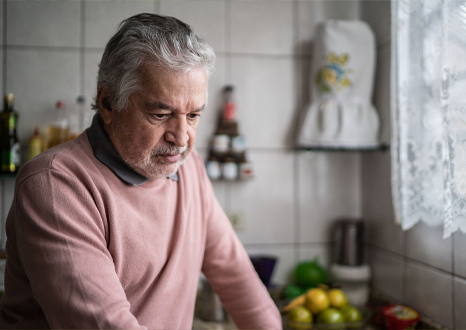
Cancer is among the leading causes of death for Hispanics, along with heart disease, stroke, diabetes, and accidents.
Even among Hispanics who are successfully treated for cancer, rates of emotional well-being and quality of life during the survivorship period tend to be lower compared to non-Hispanic whites. Now, Frank Penedo, Ph.D., of Sylvester Comprehensive Cancer Center and the University of Miami Miller School of Medicine is leading a first-of-its-kind study to better understand why.
Dr. Penedo, a professor of psychology and medicine and director of Sylvester’s Cancer Survivorship Program, knows some of the reasons. Hispanics are three times less likely than non-Hispanic whites to have adequate health insurance, and they earn less money on average, making it harder to access life-saving cancer screenings or, once diagnosed, receive adequate and timely treatments.
But Dr. Penedo also believes that lack of knowledge, fear, and stigmatization of cancer in racial/ethnic minority communities also may play a major role.
While growing up in Miami, he remembers stories of Spanish telenovelas viewed by his family where the villain gets cancer as punishment from God. In Haitian-American communities, some will tell you that “God’s pencil has no eraser,” meaning if you do something bad, it gets written down, and you are punished for it — a concept that has also been linked to cancer as a punishment.
Dr. Penedo said those perceptions and beliefs could result in a complex challenge for our communities.
Friends and family may grow nervous, even fearful, of those diagnosed with cancer. And the cancer patients themselves can feel weighed down by guilt and shame, which adds heightened levels of anxiety to their difficult road ahead.
“Cancer may still be perceived as a punishment among many in our communities. In some cases, it is stigmatized almost as much as other conditions like HIV, and some refuse to even say the word cancer out loud,” Dr. Penedo said.
“The problem with that is that if you believe you’re being punished because of something you did wrong, it just exacerbates the stress of the experience.”
To help address some of these challenges, Dr. Penedo is leading a six-year study to analyze what drives some of the quality of life, emotional and social experiences, and health outcomes in Hispanic cancer survivors. His research team received a $9.8 million grant from the National Cancer Institute to examine a wide range of factors that may affect social, emotional, and physical well-being. Dr. Penedo’s team will study:
- Stress, social isolation, knowledge and beliefs about cancer.
- Sociodemographic factors like income, insurance coverage, and access to health care.
- Ethnic factors such as perceived discrimination and acculturation.
- Psychosocial factors like optimism and social support networks at home and beyond.
- Behavioral factors like diet, physical activity, and adherence to the prescribed treatment plan.
Researchers have examined these kinds of issues in cancer patients before, but they have rarely focused on large samples of Hispanic patients. Even when researchers have done so, they have focused almost exclusively on people of Mexican descent since they represent more than 60% of the Hispanic population in the U.S.
That’s why Dr. Penedo’s team is recruiting a total of 3,000 patients that are split 50-50 between people of Mexican descent and those of other Hispanic backgrounds.
“It’s the first study that’s going to have a critical number of Hispanics of diverse backgrounds and comprehensively assess all of these factors at the same time longitudinally,” he said. “This will allow us to better understand some of the differences that we observe across Hispanic groups and target programs to alleviate the burden of cancer.”
A total of 1,500 participants will be recruited in South Florida to study people of Caribbean, Central American, and South American descent. They are also teaming with researchers at the University of Texas Health Science Center in San Antonio to recruit 1,500 people of Mexican descent.
“I don’t expect to find much of a difference between how a Cuban and a Mexican versus a Colombian or a Puerto Rican copes and adjusts to cancer,” Dr. Penedo said.
“But I do expect to find differences in experienced stressors, socioeconomic status, and other social determinants of health to help us better understand whether we need to focus on one factor versus another within specific Hispanic communities. This approach may give us the ability to develop more precise interventions.”
To participate in the study, people must be 18 years or older, be able to read in English or Spanish, are willing to visit the center for psychological assessments, and have completed primary treatment for breast, prostate, colon, kidney, lung, liver, stomach, or uterine cancer within the previous seven years. Participants will receive $50 each time they are evaluated – once at the start of the study, once after six months, once after one year, and then once a year afterward.
To learn more, interested participants in South Florida can call 305-243-7777 or email caminos@miami.edu, and those in Texas can call 210-562-6514 or email caminos@uthscsa.edu.